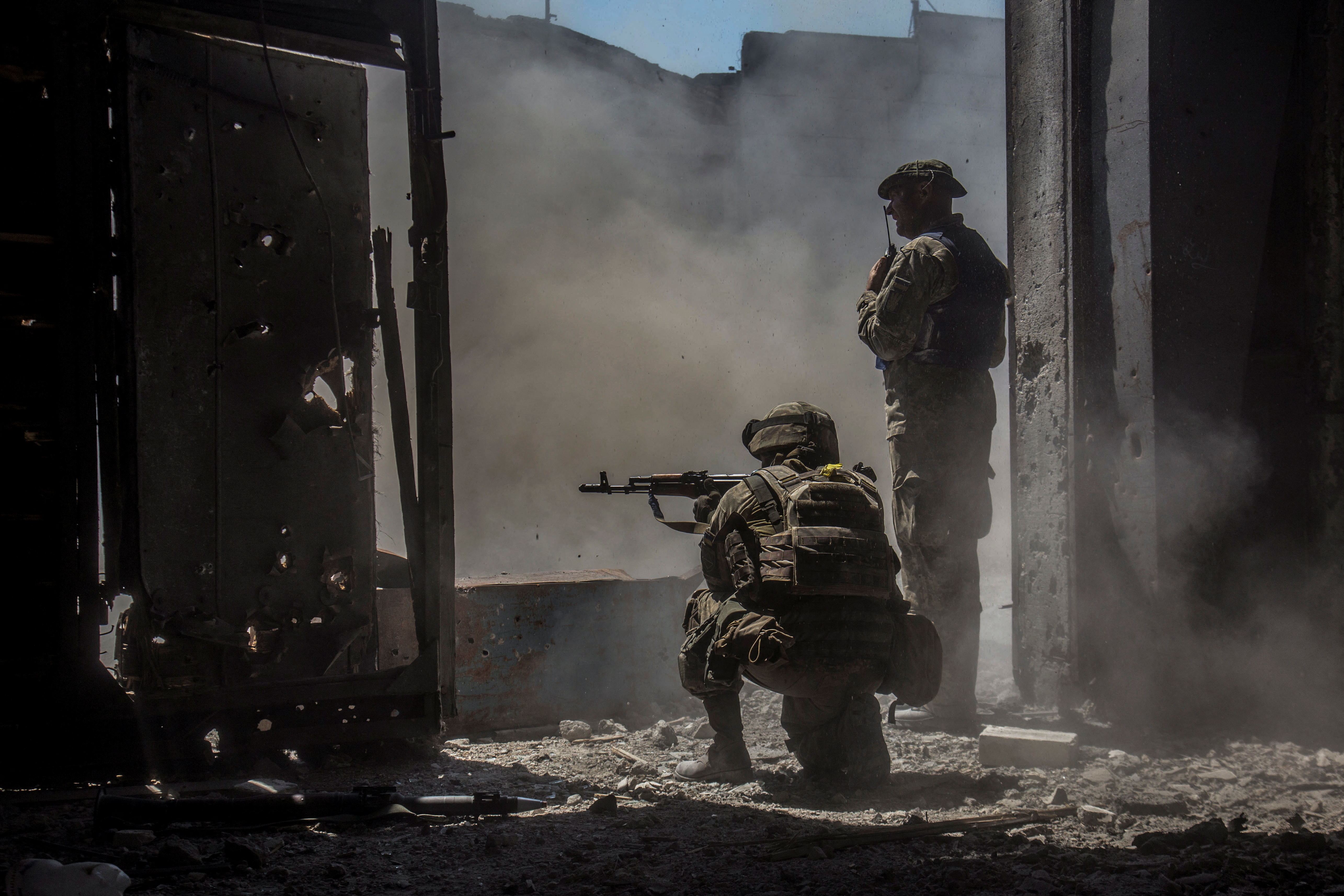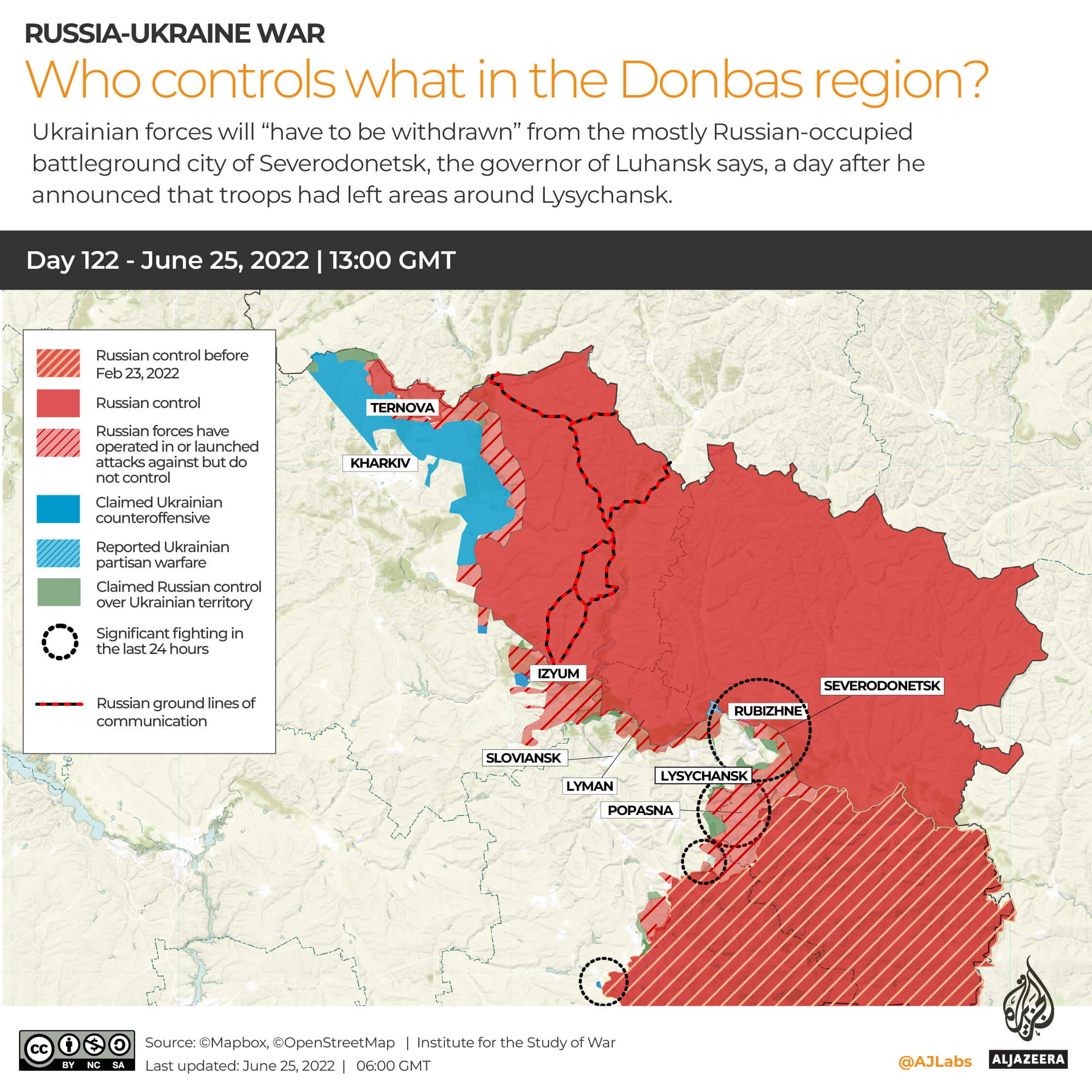
Russian forces have fully occupied Severodonetsk, the mayor of the eastern Ukrainian city said, confirming Ukraine’s biggest battlefield setback for more than a month after weeks of fighting to hold the strategic town and latest symbol of Ukrainian resistance.
Russian missiles also rained down on western, northern and southern parts of the country on Saturday as Europe’s biggest land conflict since World War II enters its fifth month.
The fall of Severodonetsk – once home to more than 100,000 people, and now reduced to a wasteland of rubble by Russian artillery – is Moscow’s biggest victory since capturing the port of Mariupol last month.
The fall of the city transforms the battlefield in the east of Ukraine where Moscow’s huge advantage in firepower had until now yielded only slow gains.
“The city is now under the full occupation of Russia,” the city’s Mayor Oleksandr Stryuk said on national television. He said anyone left behind could no longer reach Ukrainian-held territory, as the city was effectively cut off.
Russian Defence Ministry spokesman Igor Konashenkov said Ukrainian attempt to turn the city’s Azot chemical plant into another centre of resistance had been thwarted.
“As a result of successful offensive operations, units of the people’s militia of the LPR [Luhansk People’s Republic], with the support of Russian troops … completely liberated the cities of Severodonetsk and Borivske,” he said.
‘Tactical regrouping’
The head of Ukraine’s military intelligence agency described the fall of the city as a means for Ukrainian forces to regroup from Severodonetsk to higher ground in neighbouring Lysychansk.
“The activities happening in the area of Severodonetsk are a tactical regrouping of our troops. This is a withdrawal to advantageous positions to obtain a tactical advantage,” said Kyrylo Budanov, head of Defence Intelligence of the Ministry of Defence of Ukraine.
“Russia is using the tactic … it used in Mariupol: wiping the city from the face of the earth,” he said.
“Given the conditions, holding the defence in the ruins and open fields is no longer possible. So the Ukrainian forces are leaving for higher ground to continue the defence operations.”
Russia will now be hoping to press on and seize more ground on the opposite bank of the Siverskyi Donets river where Severodonetsk’s twin city Lysychansk is located.
Ukraine will also hope that the price Moscow paid to capture the ruins of Severodonetsk will leave Russia’s forces vulnerable to a counterattack in coming weeks.
Lysychansk and Severodonetsk have been the focal point of Russian offensives aimed at capturing all of eastern Ukraine’s Donbas region and destroying the Ukrainian military defending it – the most capable and battle-hardened segment of the country’s armed forces.
The two cities and surrounding areas are the last major pockets of Ukrainian resistance in Luhansk province, 95 percent of which is under Russian and local separatist control. Russians and separatist forces also control about half of Donetsk, the second province in the Donbas.
The capture of Severodonetsk is likely to be seen by Russia as vindication for its switch from its early, failed attempt at “lightning warfare” to a relentless, grinding offensive using massive artillery in the east.

The retreat from Severodonetsk also brings Moscow close to full control of Luhansk.
Al Jazeera’s Charles Stratford reporting from the capital Kyiv said the withdrawal from Severodonetsk leaves Ukrainian forces in control of just one remaining city in Luhansk.
“The big question now though is whether the Ukrainians can hold on to Luhansk. Having seemingly lost control of Severodonetsk, there is only one more city in the Luhansk region that the Ukrainian forces still control,” Stratford said.
“This is being described fundamentally as the, potentially, biggest defeat for Ukrainian forces since Mariupol last month,” he said.
Ukrainian officials said that they were pulling troops back from Severodonetsk to avoid being surrounded by the Russians, who had crossed the river in force in recent days and were advancing on Lysychansk on the opposite bank. Serhiy Haidai, governor of Luhansk, said Russian forces had attempted to enter and blockade Lysychansk.
Moscow says Luhansk and Donetsk, where it has backed uprisings since 2014, are independent countries, and has demanded Ukraine cede the entire territory of the two provinces to separatist administrations.
Missile strikes
Ukraine’s top general, Valeriy Zaluzhnyi, wrote on the Telegram app on Saturday that newly arrived, US-supplied advanced HIMARS rocket systems were now deployed and hitting targets in Russian-occupied parts of Ukraine.
Elsewhere in Ukraine, governors of western and northern regions reported multiple missile attacks, indicating that Russia was not limiting its assault to eastern territories.
“48 cruise missiles. At night. Throughout whole Ukraine,” Ukrainian presidential adviser Mykhailo Podolyak said on Twitter. “Russia is still trying to intimidate Ukraine, cause panic and make people be afraid.”
48 🇷🇺 cruise missiles. At night. Throughout whole Ukraine. Exclusively on civilian targets… Russia is still trying to intimidate Ukraine, cause panic and make people be afraid of Z-monsters… Ukraine knows everything and ready for anything. And it will punish for all the evil…
— Михайло Подоляк (@Podolyak_M) June 25, 2022
The governor of Lviv region in western Ukraine, Maxim Kozytskyi, said in a video posted online that six missiles were fired from the Black Sea at the Yavoriv base near the border with Poland. Four hit the target but two were destroyed.
In the north, Vitaliy Bunechko, governor of the Zhytomyr region, said strikes on a military target killed at least one soldier, adding that nearly 10 missiles had been intercepted and destroyed.
In the south, Oleksandr Senkevych, mayor of Mykolaiv near the Black Sea, said five cruise missiles hit the city and nearby areas on Saturday.
The number of casualties is being clarified and there was no independent confirmation of the various reports.
‘Belarus as a co-belligerent’
In another potentially significant development, Ukraine said it had come under “massive bombardment” early on Saturday morning from neighbouring Belarus, a Russian ally not officially involved in the conflict.
Twenty rockets “fired from the territory of Belarus and from the air” targeted the village of Desna in the northern Chernigiv region, Ukraine’s northern military command said. It said infrastructure was hit, but no casualties had yet been reported.
“Today’s strike is directly linked to Kremlin efforts to pull Belarus as a co-belligerent into the war in Ukraine,” the Ukrainian intelligence service said.
Ukraine’s air command also said Russian long-range Tu-22 bombers were deployed from Belarus for the first time. Belarus hosts Russian military units and was used as a staging ground before Russia invaded Ukraine in February, but its own troops have not yet crossed the border.
On Saturday afternoon, Russian President Vladimir Putin said Moscow would send Belarus missiles able to carry nuclear warheads within months.
“We will transfer to Belarus Iskander-M tactical missile systems, which can use ballistic or cruise missiles, in their conventional and nuclear versions,” he said, as he met his Belarusian counterpart Alexander Lukashenko in Saint Petersburg.






